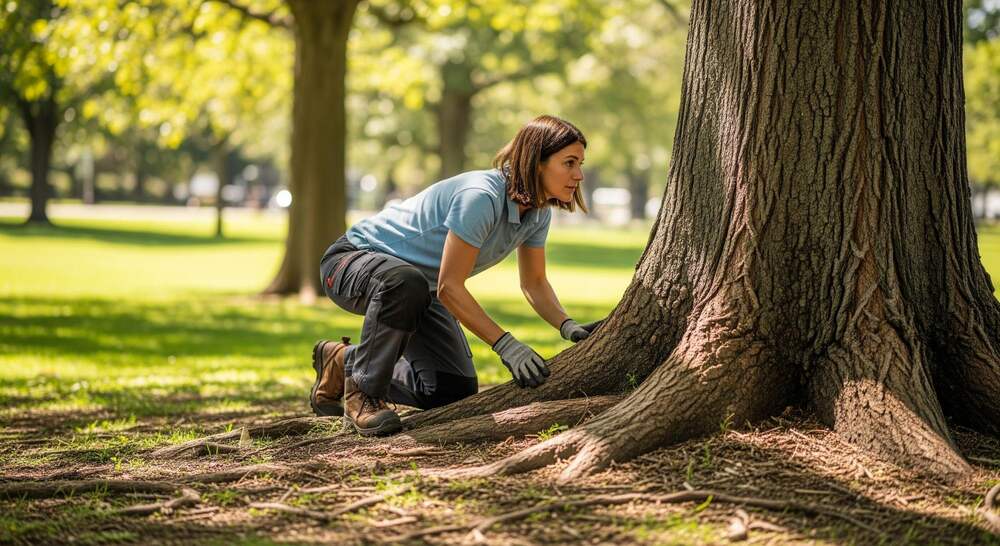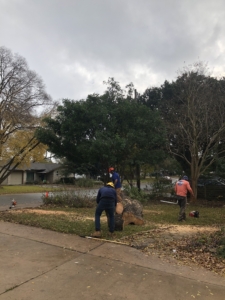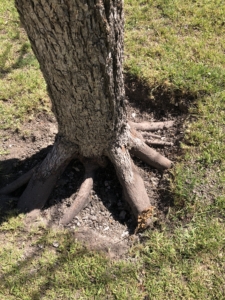Tree Fertilization Services in Austin, TX | Residential & Commercial Deep Root Fertilization
![]() 230+ Google Reviews
230+ Google Reviews
Schedule an Appointment Today & Find Out Why Our Customers Consistently Rate Our Austin Tree Company 5 Stars: 512-212-0010
![]() 230+ Google Reviews
230+ Google Reviews
Schedule an Appointment Today & Find Out Why Our Customers Consistently Rate Our Austin Tree Company 5 Stars: 512-212-0010
Urban and drought-prone landscapes like Central Texas put trees under constant stress. Hot summers, compacted soils, and limited nutrient cycling create conditions where even mature trees struggle to access the resources they need. Without intervention, valuable trees may decline slowly over time—showing symptoms like thinning canopies, premature leaf drop, or increased vulnerability to disease.
Deep root fertilization is one of the most effective ways to strengthen your trees against these pressures. By delivering nutrients directly to the root zone, this service supports healthier growth, better resilience, and longer lifespans. For homeowners and property managers in Austin, deep root fertilization is not just maintenance—it’s an investment in preserving the shade, beauty, and safety that trees provide.

Not all fertilization methods are equal. Some companies rely on surface applications or quick-release products that deliver short bursts of nutrients but fail to address deeper problems. At Happy Tree Expert Tree Services & Arborist in Austin, we use science-backed methods that provide lasting benefits below the soil line. Our approach combines certified arborist evaluations, soil testing, and professional-grade products to achieve measurable results.
Before we perform any treatment, our ISA Certified Arborists conduct a full evaluation of your trees and site conditions. We consider species-specific requirements, the age of the tree, the condition of the soil, and the surrounding environment. This careful evaluation ensures that treatments are targeted and effective. A live oak in a clay-heavy yard, for example, will need different support than a cedar elm growing near a driveway. Certification gives our team the training to make those distinctions.
Central Texas soils vary widely, but many share issues like high alkalinity or compaction. We perform soil tests to determine pH levels and identify nutrient deficiencies. By knowing exactly what the soil lacks—or what may already be present in excess—we can customize a nutrient blend that addresses the specific needs of your trees. This prevents over-application, reduces waste, and ensures your investment delivers the intended benefits.
Unlike quick-release lawn fertilizers, the products we use are designed specifically for trees. They release nutrients gradually, giving roots consistent access over an extended period. This slow, steady delivery reduces the risk of root burn, promotes balanced growth, and supports overall tree health. By focusing on arboriculture-grade solutions, we avoid the pitfalls of “one-size-fits-all” products that are not tailored to woody plants.
Deep root fertilization is a specialized process that delivers nutrients directly into the soil where tree roots absorb them most effectively. For Austin properties, where soils are often compacted and rainfall is inconsistent, this method is far superior to surface applications.
Using professional equipment, we inject a liquid fertilizer solution 6 to 8 inches into the soil around the critical root zone of the tree. Injections are spaced evenly to distribute nutrients throughout the entire root area. The pressure of the injection also helps break up compacted soil, improving oxygen and water movement into the root system. This dual benefit—nutrient delivery and soil aeration—makes deep root fertilization highly effective.
In natural settings, trees benefit from nutrient cycling as leaves decompose and enrich the soil. In urban and suburban landscapes, leaves are often removed, lawns compete for nutrients, and soils are compacted by foot traffic or construction. As a result, trees in managed landscapes rarely receive the organic input they would in the wild. Deep root fertilization restores those missing nutrients directly to the root system, compensating for the limitations of urban environments.
One of the greatest benefits of deep root fertilization in Central Texas is improved drought tolerance. By strengthening root systems and promoting deeper growth, fertilized trees are better able to access water during dry conditions. This increased resilience helps them survive summer stress and reduces the risk of decline during extended periods without rain.
Trees often show visible signs when they are not getting the nutrients they need. Recognizing these symptoms early allows you to intervene before the damage becomes severe.
Nutrient deficiencies, especially in nitrogen or iron, commonly appear as pale or yellowing foliage. If your tree’s leaves lose color outside of natural seasonal changes, fertilization may be necessary to restore health.
If your tree’s canopy looks thin or growth has slowed noticeably, it may be struggling to generate enough energy. Deep root fertilization can stimulate new growth and encourage a fuller canopy, especially in species that should naturally grow more vigorously.
Premature leaf drop or dieback at branch tips can signal stress caused by poor nutrient uptake. Left untreated, these problems weaken the tree’s structure and make it more vulnerable to pests and disease. Fertilization can help reverse this decline by restoring energy reserves.
When trees lack proper nutrition, their natural defenses weaken. You may notice insect infestations that a healthy tree would normally repel. Fertilization strengthens the tree’s immune system, helping it resist borers, mites, and other common pests.
For ornamental and fruiting species, nutrient deficiencies often show up in fewer blooms or reduced fruit yields. Balanced fertilization can restore flowering cycles and improve fruit quality, making the tree more productive and visually appealing.
When nutrients fail to reach the top of the tree, upper branches may begin to die back. This is often a sign that roots are not functioning efficiently. Deep root fertilization targets the problem directly, revitalizing root systems so they can deliver resources throughout the canopy.
 The soils in Austin and the surrounding Hill Country present unique challenges for tree growth. High clay content, poor drainage, and elevated pH levels limit nutrient availability and restrict root development. These factors make standard surface applications ineffective and highlight the need for professional, deep-rooted care.
The soils in Austin and the surrounding Hill Country present unique challenges for tree growth. High clay content, poor drainage, and elevated pH levels limit nutrient availability and restrict root development. These factors make standard surface applications ineffective and highlight the need for professional, deep-rooted care.
Much of Central Texas is covered in heavy clay soil that holds water near the surface while suffocating roots below. This creates conditions where trees are both water-stressed and oxygen-deprived. Deep root fertilization delivers nutrients past the dense surface layer, helping roots access resources they cannot otherwise reach.
Alkaline soils common in this region often prevent trees from absorbing critical nutrients like iron, manganese, and phosphorus. Even if these nutrients are present, high pH levels can render them unavailable to roots. By testing soil and applying targeted blends, we correct deficiencies and bypass the natural lock-out effect.
Commercial and residential properties alike deal with compacted soils caused by driveways, patios, and daily foot traffic. Compaction reduces pore space in the soil, limiting oxygen and water availability. Our deep root injections not only deliver nutrients but also relieve compaction, improving overall soil health and making conditions more favorable for long-term growth.
One of the most common questions property owners ask is when to schedule deep root fertilization and how often it should be repeated. The truth is that timing and frequency matter as much as the treatment itself. Fertilizing too often can create imbalances, while fertilizing too infrequently may leave trees undernourished during critical growth periods. Our ISA Certified Arborists design fertilization schedules that reflect the needs of your trees, the conditions of your soil, and the challenges of the Central Texas climate.
In Austin, the best times for deep root fertilization are late fall and early spring. In fall, cooler weather and warm soil create an ideal environment for root uptake. Nutrients applied at this time strengthen trees before winter dormancy and prepare them for vigorous spring growth. Early spring is another excellent window, as trees are waking up from dormancy and ready to absorb nutrients that support leaf expansion, flowering, and structural growth.
Summer and winter fertilization are less effective because extreme heat or cold slows root activity. By focusing treatments on late fall and early spring, we maximize nutrient uptake and reduce stress on your trees. This timing aligns naturally with our seasonal tree care services Austin, which are designed to give your landscape consistent support throughout the year.
The right frequency for fertilization depends on species, soil conditions, and property usage. Many trees in Austin benefit from annual treatments, particularly those in high-stress environments such as compacted urban soils or commercial landscapes. Our Austin commercial tree services include fertilization, planting, and soil care designed for long-term property health. In other cases, biennial applications may be sufficient for hardy, well-established trees growing in healthier soils.
Our arborists assess soil test results, tree age, canopy density, and stress factors before recommending a plan. By creating tailored schedules, we ensure that fertilization supports your trees without unnecessary repetition.
Deep root fertilization is not an instant fix. Within a few months, you may notice greener foliage, fuller canopies, and more vigorous new growth. These visible improvements reflect the tree’s improved energy production. Long-term benefits, such as stronger root systems and better drought resistance, take more time to develop. With annual or biennial treatments, these results build year after year, creating healthier trees with greater resilience to Central Texas conditions.
Fertilization is about more than a short-term boost. Done correctly, it supports every aspect of tree health and prepares trees to withstand environmental pressures for decades.
One of the most valuable long-term benefits of fertilization is stronger root development. Nutrient-rich soils encourage roots to grow deeper and wider, providing better anchoring. In storm-prone areas like Austin, trees with deeper roots are less likely to topple during high winds or heavy rains. This stability protects both the tree and nearby structures.
Healthy soils are full of microorganisms and fungi that work in partnership with roots. Fertilization replenishes nutrients that fuel this underground ecosystem, promoting improved nutrient cycling and long-term soil vitality. By building healthier soil, fertilization benefits not just individual trees but the entire landscape.
Healthy trees are naturally better at defending themselves. With stronger root systems and balanced nutrition, trees can produce chemical defenses that deter pests like borers and resist fungal infections such as leaf spot. Instead of relying solely on reactive treatments, fertilization strengthens your trees so they are less likely to need intervention in the first place.
 Deep root fertilization is just one part of a complete plant health strategy. At Happy Tree Service of Austin, we integrate fertilization with diagnostics, soil care, and monitoring to provide comprehensive support for your trees.
Deep root fertilization is just one part of a complete plant health strategy. At Happy Tree Service of Austin, we integrate fertilization with diagnostics, soil care, and monitoring to provide comprehensive support for your trees.
We begin with an evaluation that may include visual inspection and soil testing. These diagnostics guide our fertilization plans, ensuring that treatments are customized to your tree’s specific needs. For broader landscape needs, we also integrate fertilization with Austin tree planting and other long-term soil health strategies. By starting with accurate information, we avoid unnecessary applications and deliver more effective care.
Fertilization is most effective when roots have room to breathe and absorb nutrients. In compacted soils, we may recommend pairing deep root fertilization with aeration or root zone invigoration. These treatments use air spading and compost blends to break up dense soils, add organic matter, and stimulate beneficial fungi. Together, these services create an environment where fertilization produces the greatest possible impact.
Tree care is not static. Soil composition changes, stress factors shift, and trees evolve as they grow. That’s why our arborists provide ongoing monitoring and make adjustments to fertilization schedules as needed. By evaluating canopy density, growth rates, and soil health over time, we adapt care plans to meet your trees’ changing requirements.
The health of your trees depends on what happens beneath the soil. Deep root fertilization strengthens root systems, improves soil vitality, and prepares your trees to resist drought, pests, and storm stress. For homeowners and property managers in Austin, this service is one of the most effective ways to preserve the beauty, safety, and value of your landscape.
At Happy Tree Service of Austin, we combine certified arborist expertise with local experience to deliver results you can trust. From soil testing to tailored nutrient blends, we use science-based methods to give your trees the strongest possible foundation. With Austin tree healthcare services led by ISA Certified Arborists, we ensure your trees remain healthy, resilient, and beautiful year after year.
Call us today at 512-599-9948 or reach out online to schedule a free estimate for deep root fertilization. With professional care timed to Central Texas conditions, your trees can thrive season after season, providing shade, beauty, and protection for years to come.
Evan Peter, Certified Arborist – TX-4602A
Lewis Heye, Certified Arborist – TX-3510A

